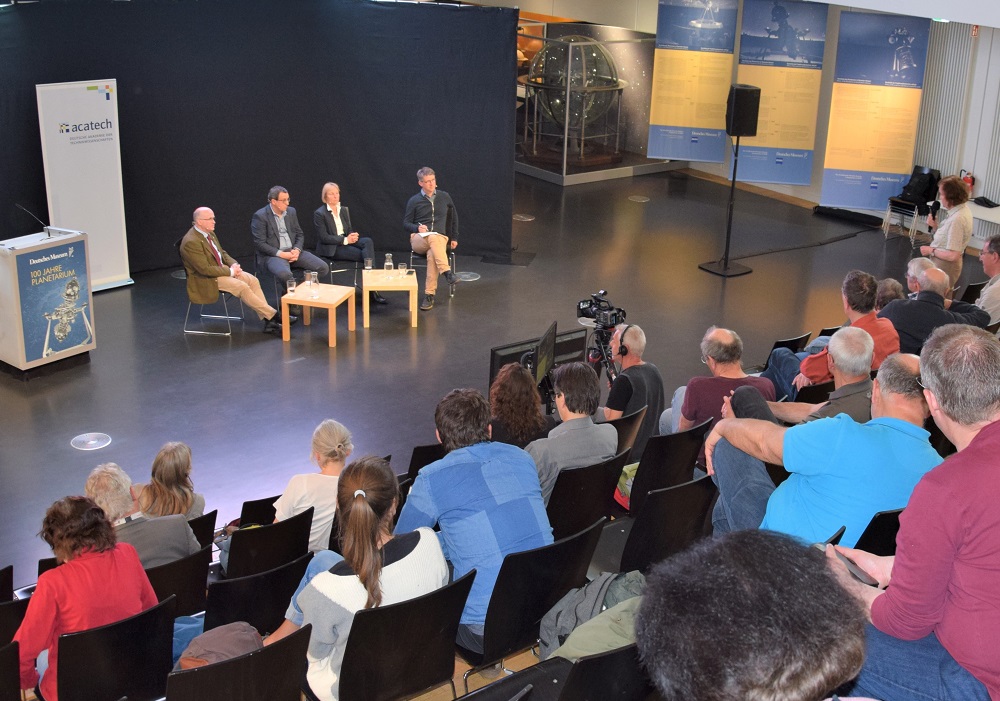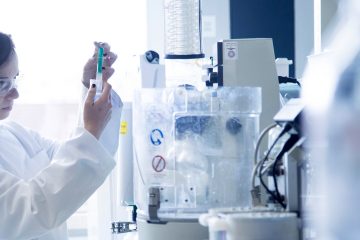Safe food supply with less pesticide use

Munich, 15 May 2023
Pests and diseases destroy up to 40 per cent of crop harvests every year. Due to travel and trade, humans are partly to blame for the spread of harmful organisms. What can be done to keep plants healthy and safeguard the food supply? This was the main topic of discussion at acatech am Dienstag on 9 May, which was held in cooperation with the Catholic Academy in Bavaria and the Deutsches Museum.
Prior to the in-person panel discussion, which took place in the auditorium of the Deutsches Museum in Munich and was live-streamed on YouTube, Sabine Gerber-Hirt (Deutsches Museum) gave a tour of the exhibition she curated and which is entitled “Agriculture and Food”.

In her introduction to the evening event she went into the concept behind, and her approach to, the exhibition. It was designed with questions such as “What are the requirements that agriculture needs to meet today?” and “How can agriculture be sustainable and yet provide an adequate income for farmers?” in mind and gives visitors the opportunity to come up with the answers for themselves, said Sabine Gerber-Hirth.
Bernhard Bleyer, Chair of Theological Ethics at the University of Passau, moderated the event. He pointed out in his welcome address that plant health is key for agriculture to ensure food security for the global population. The Food and Agriculture Organization of the United Nations (FAO) has designated 12 May the International Day of Plant Health (IDPH) to raise awareness of the importance of plant health for environmental protection and biodiversity.
Recording of the event (in German):
Duration: 1 hour 33 minutes and 5 seconds
In the subsequent keynote speech, Bernhard C. Schäfer, Head of the Institute for National and International Plant Health at the Julius Kühn-Institut in Brunswick, illustrated the consequences of introduced harmful organisms based on the example of potato blight. Blight was introduced to Europe from North America in the 19th century and, in Ireland in particular, led to crop failure and years of famine with an impact on population size that has lasted to this day. This is why it is hugely important to safeguard plant health. Doing so involves keeping plant stocks free of harmful organisms by taking quarantine and quality measures; that is, preventive measures as opposed to plant protection measures. Even today it is important to act fast, effectively and at European level to ward off newly introduced pathogens and pests, such as bacterial leaf scorch and the Asian long-horned beetle. In the latter case, measures have already been very successful at greatly reducing its spread, reported Bernhard C. Schäfer. In conclusion, he called on everyone to play their part by not bringing home botanical souvenirs from their travels to non-EU countries, by getting rid of invasive plants or by reporting sightings of quarantine pests.
Plants have an immune system that is fundamentally very similar to humans’ innate immune system. This piece of information from Ralph Hückelhoven, Head of the Chair of Phytopathology at the Technical University of Munich, came as a surprise to the audience. He also went into the preventive breeding measures that can be taken against rapidly adapting pathogens; that is, micro-organisms or viruses that can cause disease. Synthetic chemical pesticides should be a last resort, he said. The possibilities of biological plant defence mechanisms should be exhausted first.
Anja Klatt, Senior Manager Public & Government Affairs, Agricultural Solutions at BASF SE, pointed out the important contribution that research makes in solving the problems associated with introduced harmful organisms. BASF SE no longer relies primarily on the use of chemical agents. Rather, it is increasingly researching biological plant protection, the development of resistant species as well as the increased use of digitalised processes. Policy makers and society agree that pesticide use must be greatly reduced, and this is also a target of the European Green Deal. However, it is also crucial, said Anja Klatt, to provide effective alternatives to ensure a sustainable food supply and gauge possible risks.
During the subsequent panel discussion, the questions put by the audience of around 100 people (in the auditorium and online) mainly concerned European efforts to reform plant protection as well as the diverse array of potential solutions, which should not be restricted as a matter of principle.
The event took place as part of the Flower Power Festival München.




